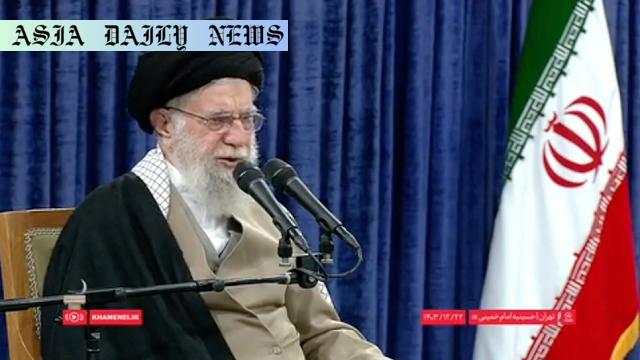Iranian Nuclear Issue: Iran, China, and Russia deputy ministers to meet in Beijing to address nuclear concerns and US relations.
Iran’s deputy foreign ministers will meet with counterparts from China and Russia in Beijing to deliberate on Iran’s nuclear program.
Focus will also be given to US pressures for negotiations and tougher sanctions on Iran amidst heightened global tensions.
Iran has dismissed US-led negotiation offers, labeling them as attempts to mislead public opinion.

Background on the Iranian Nuclear Issue
The Iranian nuclear issue has long been a focal point of international diplomacy, with various countries attempting to mitigate potential proliferation risks while balancing geopolitical interests. Recently, the stakes have heightened as deputy foreign ministers from Iran, China, and Russia announced their scheduled meeting in Beijing to discuss the matter. This meeting signifies a tripartite collaborative effort to address ongoing challenges related to Tehran’s nuclear program amidst rising tensions with the United States.
In recent years, the US has adopted a hardline approach, imposing stringent sanctions on Iran to penalize what is perceived as non-compliance with international nuclear agreements. In retaliation, Iran has escalated its nuclear development programs, arguing that its actions align with sovereign rights. The involvement of China and Russia in these discussions underscores their significant role in influencing this global issue as longstanding allies of Iran and as counterbalances to US influence on the global stage.
Recent Developments Highlighting US-Iran Relations
One of the major developments in this ongoing issue was President Trump’s recent move to extend an invitation for negotiations with Iran. While the American administration portrayed this as a gesture of diplomacy, Iranian leaders, including Supreme Leader Ayatollah Ali Khamenei, dismissed the attempt, interpreting it as a tactic to sway public opinion. Khamenei further stated that the gesture was intended to depict the US as a peace broker, with Iran serving as the scapegoat for diplomatic breakdowns.
Tehran initially denied receiving the US President’s letter, only to confirm it later through Iranian Foreign Minister Abbas Araghchi. According to Iran, the message was delivered through the United Arab Emirates, further complicating regional geopolitical dynamics. The mixed signals from both nations have only intensified the lack of trust that has plagued talks over the years.
The Geopolitical Role of China and Russia
As key allies of Iran, China and Russia have a vested interest in the outcome of the nuclear discussions. Both countries are proponents of multilateral diplomacy and are likely to advocate for peaceful resolutions that reduce US dominance in the region. Their involvement serves not only as a lifeline for Iran’s embattled economy but also as a counternarrative to Western attempts at isolating Tehran.
China, for instance, has secured extensive bilateral trade deals with Iran, prioritizing access to its energy resources. Russia, similarly, continues to offer diplomatic and defense support to Iran, strengthening their strategic partnership. By participating in the Beijing meetings, both nations show their commitment to supporting Iran while possibly formulating a united front against growing Western influences.
Prospects for Negotiations and Global Stability
The outcome of the Beijing meeting could have far-reaching implications for global stability. While it remains unclear whether any definitive solutions will emerge, the fact that key stakeholders are engaging in discussion is a positive development. However, skepticism remains about whether Iran, China, and Russia will respond constructively to the United States’ continued calls for dialogue.
The lack of trust between Iran and the United States remains a major roadblock. Unless confidence-building measures are initiated, there is little chance for substantive progress. Countries like China and Russia can play pivotal moderating roles to bridge gaps between both nations while ensuring multilateral benefits.



Commentary
The Context of US-Iran Relations
The evolving tensions between the United States and Iran offer a microcosm of the broader geopolitical challenges the world faces today. On one hand, the US has leveraged its economic prowess to impose sanctions aimed at forcing Iran into compliance. On the other hand, Tehran has staunchly defended its nuclear program as a matter of national sovereignty. Within this framework, China and Russia’s involvement symbolizes the growing complexity of global politics where regional powers advocate for their national and allied interests.
The Strategic Stakes for All Parties
While the United States continues to advocate for tougher sanctions, it is crucial to acknowledge the humanitarian impact on the Iranian population. Economic blockades disadvantage ordinary citizens, potentially fomenting resentment against foreign intervention. A more balanced approach with dialogue as the centerpiece might yield better results in both reducing nuclear weapons proliferation and fostering global stability.
For Iran, the stakes go beyond mere survival to asserting its role as a regional leader. By aligning itself with influential players such as China and Russia, Tehran demonstrates its resilience against a unipolar world order. Meanwhile, China and Russia strive to strengthen their influence in Middle Eastern geopolitics, cementing their roles as crucial players whose actions affect global outcomes.
The Path Forward for Diplomacy
Collaboration between nations like Iran, China, and Russia offers a glimmer of hope in an otherwise bleak situation. However, for meaningful progress to occur, all sides must approach the table with genuine intent. The US, while justified in its concern for nuclear security, needs to reevaluate strategies that prioritize punitive measures over constructive engagement. Similarly, Iran needs to exhibit greater transparency to rebuild trust with the global community.
As observers of this developing narrative, it is imperative to recognize the nuanced layers at play. From humanitarian considerations to strategic national interests, the stakes involved demand not just political solutions but also global cooperation. Let’s hope that dialogue, not discord, takes precedence in the lead-up to resolutions on the Iranian nuclear issue.